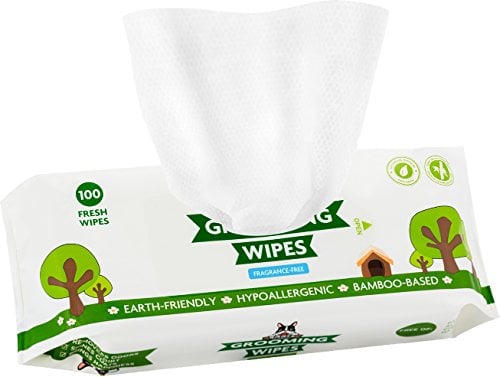- This post contains affiliate links. Read more here.
I grew up with a terrier mix named Caesar. He was a sweet, playful dog, but my favorite thing about him was that he loved bath time. I was used to washing cats who didn’t need, want, or like it (I am from a very boring town and had to invent ways to keep myself busy. Forgive me, kitties!), and Caesar’s unabashed enthusiasm for bathing was a refreshing change. As a result, he was the cleanest dog on the block.
For most dog owners, the issue is a bit more complicated, though. Whether it’s that your schedule is jam-packed or your dog isn’t a fan of the bathtub, weekly baths are not likely to be on the calendar. But how often should you wash your dog? We asked around, and we’ve got some answers for you.
When They Smell Bad
I reached out to several of my dog-loving friends to ask how often they wash their dogs, and while there was some variation in their answers, there was a recurring theme: poop.
“I wash my dog when he rolls in poop,” said Meghan. “So, every 3-4 months.”
Added another friend, “When spring rolls around, Abby rolls around, too. I call it ‘doggy perfume season.’ She gets a lot of baths this time of year.” Another friend told me that her Australian cattle dog, Snickers, has aged into a certain…ripeness, to put it mildly.
“I wash Snickers when her corpse-y musk gets overpowering,” Jenn told me. For some dogs (and their owners), the answer to “How often should I wash my dog?” is pretty darn simple. It’s when they get stinky.
The Short Answer: It Depends
But what about dogs less likely to roll in poop? What is the ideal bathing schedule for them? Well, it depends.
According to Dr. Erin Perrotti-Orcutt, how often your dog needs to be washed is decided by several factors. There are plenty of physical considerations, such as your dog’s skin and fur type, breed, and health. Dogs with thick undercoats will need more frequent bathing than short-haired breeds, or dogs with sensitive skin.
Lifestyle is another important factor. “Before we had kids, we washed our two big, hairy dogs every week, with a creme rinse, also!’ Dr. Perrotti-Orcutt told me. “They looked, smelled, and felt delicious. Then we had kids and we all just got stinky.”
Daily Maintenance Is Key
To keep your pet’s coat clean and free of debris between baths, establish a routine of daily brushing. Regular brushing distributes natural oils evenly through their fur and gives your dog a glossy, healthy appearance. Plus, it cuts down on shedding.
For most dogs, this should take about 5-10 minutes and can be worked into your walk routine.
An occasional wipe down can do wonders and is a lot less time-intensive than a full bath.
Keep In Touch
One of the major benefits of washing your dog at home is that it helps you maintain familiarity with your dog’s body so that if anything is amiss, you can catch it early.
When your dog is wet, it’s easier to examine them for skin masses and parasites (fun!), which have the best prognosis with early intervention.
If you prefer to outsource your dog-washing, use the same groomer consistently so they’re familiar with your dog’s skin and can tell you if they notice anything out of place.
Okay, But How Often Should I Wash My Dog?
According to the ASPCA, your dog should be washed at least every three months, so 3 or 4 times a year. The actual number may be higher if your dog is extremely hairy, or particularly enthusiastic about rolling in poop, but most dogs should be able to get by with quarterly baths. And that’s my final answer.
As in most things, what matters is what will work for you, your dog, and your family. Don’t sweat it if a little time passes between baths. Unless you’re bothered by the smell or your dog is uncomfortable, it’s a-okay. If my informal survey is any indication, you’re in good company.
In fact, one friend informed me that she never washes her dogs at all, saying, “They just have a perfect doggy smell. We never feel the need!”
To each their own!
Finding the Right Dog Shampoo
Is a bath in your dog’s near future?
Check out this post for natural dog shampoo choices, and this one for safe scented options for your dog.


